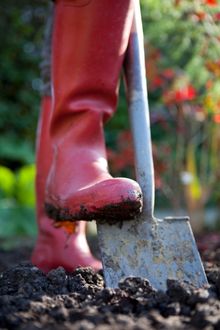
Gardening experts agree that cultivating rich soil is the best investment that you can make in your yard. Plants thrive naturally when soil is loose, moist, full of essential nutrients and well-draining. That may sound like a tall order, but nature does all of the work for you when you add compost and mulch. By digging compost into your soil and mulching around existing plantings, you’ll create the perfect environment for plants to thrive in.
Benefits
- Plants grow deep, healthy roots.
- Plants are protected against pests and diseases.
- Plants need less water and are not stressed during dry periods.
- Soil stores and slowly releases essential nutrients.
- Pollutants that contaminate streams are trapped.
Compost, Mulch and Fertilizer
- Before planting lawn or flower beds, dig compost into soil. You can make compost right at home or buy it bagged or in bulk.
- Spread organic mulch around existing plantings in spring or fall. Composted yard debris, leaves, grass clippings and bark all work well.
- If needed, fertilize moderately with organic or slow-release fertilizers.
Here in Bellevue
Bellevue’s soil is primarily glacial till, left behind by the glacier ice and described by some gardeners as “clay except for rocks.” Glacial till is generally low in organic matter and in many yards, construction and neglect have left soils tired and depleted of goodness. Minerals and nutrients may be present, but not often in forms that are readily available to plants. Feeding beneficial organisms found in your soil is the key to restoring soil functions and plant health. Whether your soil is sand- or clay-based, build healthy soil by adding compost and mulch.
Additional resources
Soil GuideMulch Guide
Fertilizing Guide
Composting Food Scraps Guide
Composting Yard Trimmings Guide
Free Soil Testing from King Conservation District
